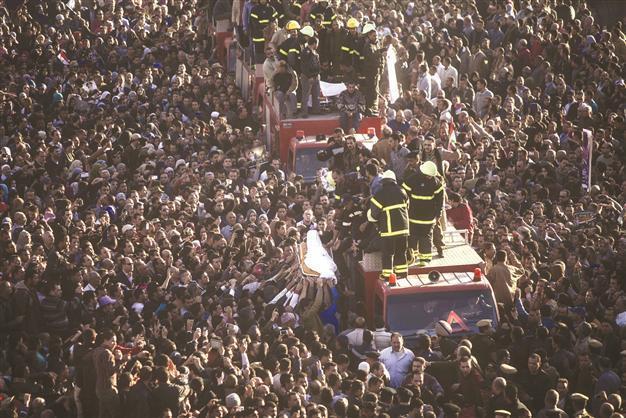Jihadist group claims Egypt police HQ suicide bombing
CAIRO - Agence France-Presse

Egyptians carry the body of a policeman, that was killed along with 12 other people in a car bomb attack, during his funeral in the Egyptian city of Mansura, North of Cairo, on December 24, 2013. AFP Photo
An Al-Qaeda-inspired group based in Egypt's Sinai on Wednesday claimed a suicide car bombing of a police headquarters that killed 15 people, the deadliest such attack since Mohamed Morsi's overthrow.
The brazen assault north of Cairo underscored the military's challenge to contain Sinai militants, who have killed more than 100 soldiers and police in a wave of attacks since the army ousted the Islamist president on July 3.
"Your brothers in Ansar Beit al-Maqdis, with the grace of God, were able to target the Daqhaleya police headquarters," the group said of Tuesday's attack, in a statement posted on jihadist forums. The group said the attack in the provincial capital Mansoura was carried out by a suicide bomber identified as "Abu Maryam." Authorities say there are links between the Sinai jihadists and Morsi's more moderate Muslim Brotherhood movement, but have offered no proof. The Brotherhood publicly renounced violence decades ago and condemned Tuesday's attack.
Morsi and top Brotherhood leaders, imprisoned in a crackdown following his overthrow, are charged with colluding with militant groups to launch attacks.
Ansar Beit al-Maqdis, whose name means "Partisans of Jerusalem" in English, had previously claimed credit for bombings in Sinai and the attempted assassination by a suicide car bomber of interior minister Mohamed Ibrahim in Cairo in September.
The group warned soldiers and police to abandon their posts "to preserve their religion and lives." It said it carried out Tuesday's attack in response to the "apostate regime's war on Islamic sharia, its shedding of Muslim blood and violation of our women's and sisters' honour." An interior ministry official told AFP on Wednesday investigators were still trying to identify the suicide bomber through human remains found at the scene of the blast, which tore down part of the police headquarters facade.
The military has sent tanks and armour to the Sinai peninsula to crush the militants, with limited success so far.
The sparsely populated desert and mountain region has presented a challenge to the army, which is unaccustomed to fighting against a sustained militant campaign.
Two soldiers were shot dead last week in a botched attempt to arrest Ansar Beit al-Maqdis leader Shadi al-Menei, the military said. Menei escaped.
But the military says it has killed 184 "terrorists" in north Sinai, which borders the Palestinian Gaza Strip and Israel, since Morsi's overthrow.
On Wednesday, the army said it had foiled an attempt by a member of the Palestinian Hamas movement to blow up a security installation in Sinai.
The nature of the Sinai attacks has changed as the militants appear to be adapting to the military's campaign, said David Barnett, a research associate at The Foundation for Defence of Democracies, a US think tank.
"In the beginning, you saw a huge uptick in July. Now attacks in the Sinai are down to 10 or 12 this month," said Barnett, whose research focuses on Sinai militants.
"But what you've seen is a change of tactics; rather than what I'd call attacks of convenience, such as shooting attacks, the attacks are bigger and bolder." The known members of Ansar Beit al-Maqdis are Egyptians, many of them Bedouin from Sinai, with others hailing from the Nile Delta.
In November, an Ansar Beit al-Maqdis bombing killed 11 soldiers when an army bus drove past a booby-trapped car on a desert road in north Sinai. The militants have also targeted police and military buildings.
Tuesday's attack, however, came as a shock to the military-installed government because of its scale and location. "What we saw yesterday was a qualitative transformation in terrorism," prime minister Hazem al-Beblawi told reporters on Tuesday after the attack.
Beblawi, soon after the attack, had branded the Muslim Brotherhood a "terrorist" group, according to a spokesman, but stopped short of blaming it for the bombing.
More than 1,000 people, mostly Islamists, have been killed in street clashes with police in a crackdown on the Brotherhood since Morsi's overthrow.
The Brotherhood says it is committed to peaceful protests to reinstate Morsi and blames the military-installed government for the violence.
